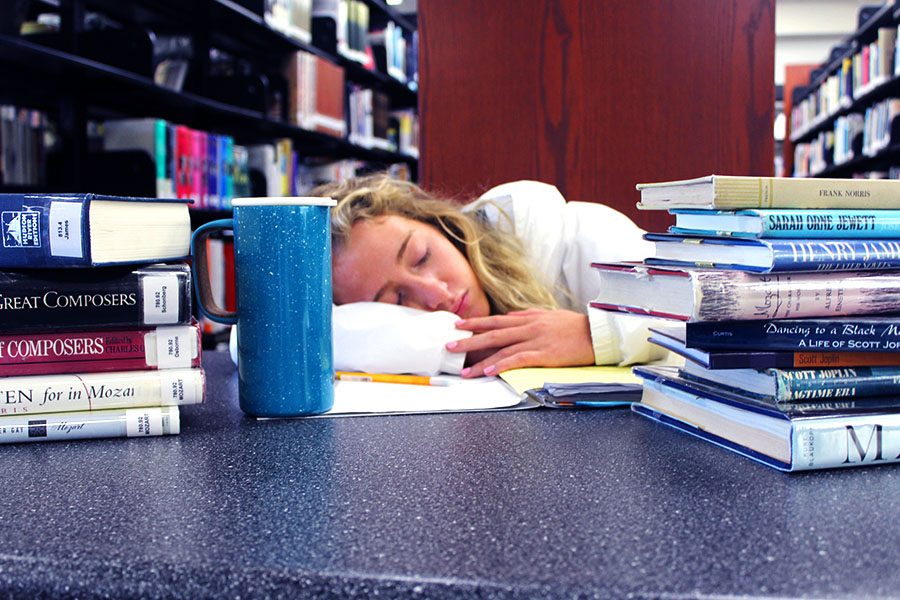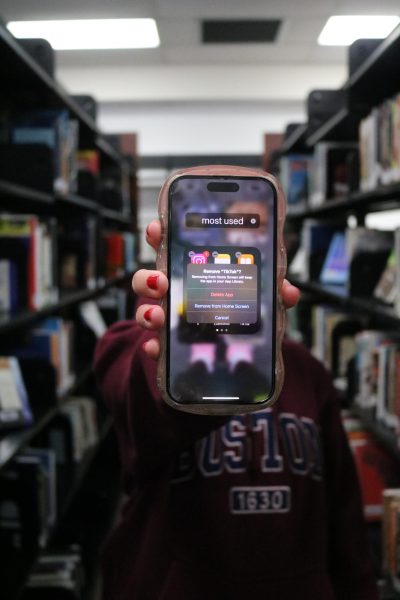District discusses later start time option
Senior Olivia Devin conveys the struggle students face balancing a healthy amount of sleep and their workload.
Last spring, District 128 assembled a task force made up of teachers and administrators from Libertyville and Vernon Hills High Schools, along with members from the district office, to discuss the possibility of pushing back the school start time.
Dr. Rita Fischer, the district’s Assistant Superintendent for Curriculum and Instruction, explained how the task force combined existing efforts to look into the topic.
“There was some independent research going on among some teachers and administrators and because of those reasons, we as a district believed it was time to really begin to investigate the idea of a start time and how it connected to research on what the ideal start time for students would be,” she said.
Studies done by the University of Minnesota and the American Academy of Pediatrics have shown that when the school start time is pushed back, student engagement in classes is enhanced, traffic incidents go down, and overall student health and well-being is bettered.
Fischer explained that while many people believe that if the start time is pushed back then students would just stay up later, there is scientific evidence that negates that idea: “The University of Minnesota found that at least 60 percent of students get at least eight hours of sleep if you push the start time back.”
Spencer Nassar, an LHS junior, agrees that a later start time would benefit students, even if students were to stay up later.
“Personally, I would try to go to bed at the same time, but I might go to bed later because I would have more time. Even if [students] did stay up later, they wouldn’t feel as drowsy in the morning because it isn’t as early as a wake up [time].”
While Mr. Robert Kelch, career and technical teacher, is aware of this research, , he disagrees. Mr. Kelch believes that even if the start time is changed, students will still have to stay up late completing their homework. If less homework was assigned, Mr. Kelch said, then students would be able to get to bed earlier to get more sleep.
Lisa Lamb, a junior and three-sport athlete, is definitely affected by a heavy homework load: “My goal is to go to bed around 10 in order to get six to seven hours of sleep. If I have a ton of homework, [however], then I stay up as late as I need to. I put homework above sleep, 100 percent.”
Nevertheless, Lamb did agree that the later start time would benefit her.
“If I was able to go to school, go to my meet, do my homework, and still get a healthy amount of sleep, then I think my stress levels would go way down,” she said.
Looking ahead, Dr. Fischer explained that the task force met Oct. 12 to further their discussion on the issue and put together a recommendation about specifics regarding the school day.
“The ideal start time would be 8:30 or later,” Dr. Fischer said. “Many studies and organizations suggest that the start time should be 8:30 or later, but that doesn’t mean that that is the direction the task force will go in, or that will ultimately we’ll go with. This is all hypothetical.”
Dr. Fischer explained that the school end time, passing period length and length of classes will all be determined if a new start time is decided upon. She emphasized that the potential changing of the start time is merely a possibility and not a definite decision at this point.




![Mr. Abullh Ali, manager/assistant, helps open Queen Yemeni Coffee in downtown Libertyville at 606 North Milwaukee Ave. With the help of employees such as manager and LHS senior Yousef Taha, they are able to bring the Yemeni and Ethiopian culture to Libertyville by using their Queen spices, cinnamon and cardamom in their drinks such as Adani Chai, which is inspired by Sheda, the Queen of Yemen and Ethiopia. “The history of our coffee [is] a long history and we believe that Yemen and Ethiopia started the coffee and we are bringing something unique to the community,” Mr. Ali said.](https://www.lhsdoi.com/wp-content/uploads/2025/04/Photo-1-600x400.jpg)




Olivia Devin • Oct 17, 2017 at 9:23 am
Love this article Lizzie, it was super interesting!! Your wide variety of sources shows how much work you put into this story.